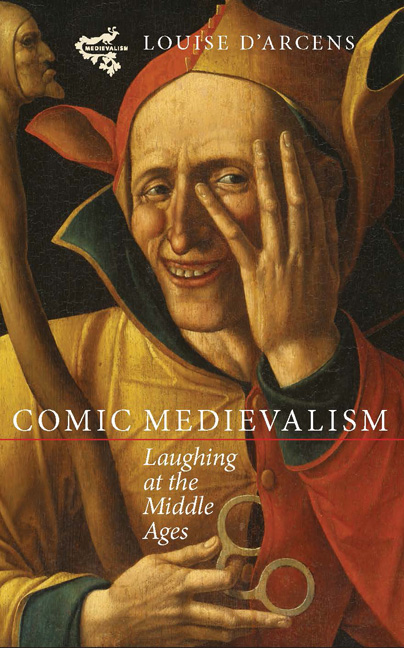Book contents
- Frontmatter
- Dedication
- Contents
- Illustrations
- Acknowledgements
- I THE SET UP
- II OLDIES BUT GOODIES: COMIC RECOVERY
- 2 Scraping the Rust from the Joking Bard: Chaucer in the Age of Wit
- 3 Medievalist Farce as Anti-Totalitarian Weapon: Dario Fo as Modern Giullare
- III HIT AND MYTH: PERFORMING AND PARODYING MEDIEVALISM
- IV THAT'S EDUTAINMENT: COMEDY AND HISTORY
- Afterword: Laughing into the Future
- Bibliography
- Index
3 - Medievalist Farce as Anti-Totalitarian Weapon: Dario Fo as Modern Giullare
from II - OLDIES BUT GOODIES: COMIC RECOVERY
Published online by Cambridge University Press: 05 November 2014
- Frontmatter
- Dedication
- Contents
- Illustrations
- Acknowledgements
- I THE SET UP
- II OLDIES BUT GOODIES: COMIC RECOVERY
- 2 Scraping the Rust from the Joking Bard: Chaucer in the Age of Wit
- 3 Medievalist Farce as Anti-Totalitarian Weapon: Dario Fo as Modern Giullare
- III HIT AND MYTH: PERFORMING AND PARODYING MEDIEVALISM
- IV THAT'S EDUTAINMENT: COMEDY AND HISTORY
- Afterword: Laughing into the Future
- Bibliography
- Index
Summary
When considering the post-medieval reanimation of comic modes as a form of ‘comic medievalism’, one of the thornier issues to negotiate is how the various modern adaptors actually view ‘the medieval’ – or, alternatively, constructions such as the ‘gothic’, or even the ‘old’, which operate analogously with ‘the medieval’ – and, in particular, whether they are well disposed toward the Middle Ages’ comic culture. In the Enlightenment, when Chaucer was regarded as a ‘merry’ precursor of modern wit, this was, until later in the eighteenth century, largely at the expense of seeing him as medieval; he was, rather, exceptional to his times, ineffably proto-modern, and it was this that made him retrievable. Those comic aspects that could not be assimilated to the modern canons of good taste were regarded as unseemly reminders of an abject ‘gothic’ pre-modernity that required excision or revision. Laughing in the Middle Ages, through embracing the elements of his work deemed to bequeath a continuous comic legacy, in many cases could not be divorced from the ridicule directed at his cultural milieu. In the case of the retrieval to be examined in this chapter, the Italian playwright and performer Dario Fo's adoption of the performance persona of the medieval giullare, the ambivalence toward the medieval takes a somewhat different, more pointedly historical-dialectical form.
- Type
- Chapter
- Information
- Comic MedievalismLaughing at the Middle Ages, pp. 68 - 88Publisher: Boydell & BrewerPrint publication year: 2014

